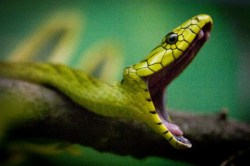A beautiful adult Basin emerald.
It seems it always happens this way. For about 20 years, on innumerable trips to Amazonian Peru, I and those who have travelled with me, have searched long and hard for what is considered by many the gem of the Amazonian rainforests, the Basin emerald tree boa, Corallus batesii.
Stated as succinctly as possible, despite the thousands of search-hours spent, we failed. We found 150 other species of herps, but when it came to the emerald, pure and simple, we failed. Years passed and this year (2015) I elected to retire. A few weeks after having done so, friend, Kenny (a biologist and geneticist) decided that he’d like to research the wildlife of what had become our major preserve, Santa Cruz Forest Preserve on the Rio Mazan in Amazonian Peru. He and his family moved to the preserve for a year long stint.
Four months into it Kenny texted me “You retired too soon” and attached a pic of the coveted emerald tree boa. It seems that Kenny, accompanied by his wife, Maria, and a village youngster, Cain, by name, were taking an evening stroll along the main trail when, only a few meters from the compound, Cain noticed the snake. It was hanging head downward, nose only a few inches from the leaf litter of the forest floor, in a small tree only a foot or so from trail edge. Kenny’s correct. I retired a few months too soon.
Continue reading “Emerald Tree Boa—Finally!” …read more
Read more here: King Snake
No products found.




















